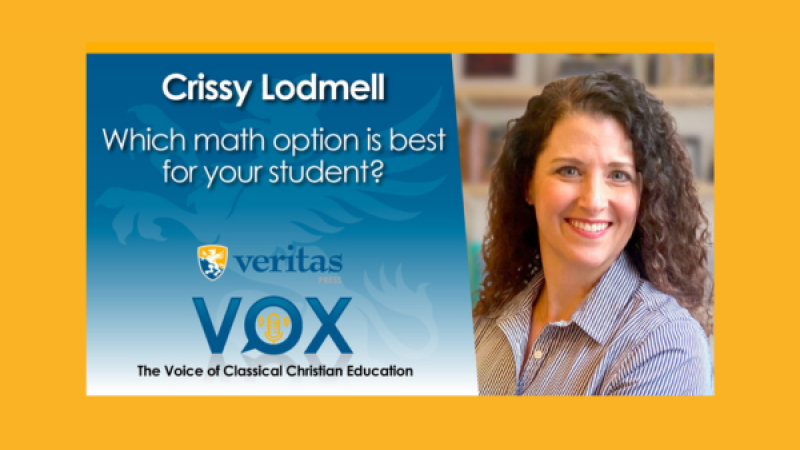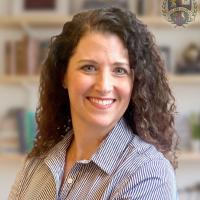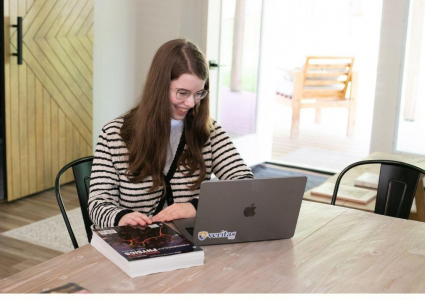Which Math Option is Best For Your Student? | Crissy Lodmell

Which mathematics option is best for your student? It depends! Veritas Scholars Academy Math teacher Crissy Lodmell joins us today to explain the different math tracks available, which ones suit what type of learners, how they work, and more!
Whether you have a strong young mathematician who hopes to graduate with the highest honors or a student who is struggling to get math concepts to stick, there is a unique program available for everyone!
Episode Transcription
Note: This transcription may vary from the words used in the original episode for better readability.
Introduction
Marlin Detweiler:
Hello again. This is Marlin Detwiler with Veritas Press and Veritas Vox, the voice of classical Christian education. Today we have with us Crissy Lodmell. Crissy, welcome.
Crissy Lodmell:
Hi. Thanks for having me.
Marlin Detweiler:
You bet. We will introduce why you're here in just a moment. But before we do that, give us a little bit of background on you, your personal circumstances, your kids, where they are and how you first became connected to Veritas.
Crissy Lodmell:
Okay, I'll go for the abbreviated version, but anyone who knows me knows that might be difficult. So my husband, John, and I have four kids, and when our oldest was born, we moved to Texas shortly after that. And that was home for me, back in Texas. And I remember having a conversation with a friend who was my best friend in high school, and she said, “Crissy, there's this new school, and Sydney is a year older than your Jack, and she's going to go to school there for kindergarten. And I want you to bring Jack there when he's in kindergarten.” And I was like, “Oh, this sounds interesting. Tell me more.” And it was a university model classical school.
It was just so ironic – the irony of God. Because I have said from the time that my kids were little, you know, I love these children dearly, but just I just really pray that God does not call me to homeschool these children because I was looking forward to the day that I could put my oldest on the school bus with his little backpack and send him off to school.
And, you know, of course, the rest is history. She convinced me to check it out. It was a university model. So two days a week at school, two days a week, homeschool, I guess. God was gracious and gentle with me to give me into this homeschooling path. But five years later we moved away and that was no longer an option.
However, all of our materials had been sourced through Veritas Press at that school. That school sourced everything through Veritas. And parents bought their own materials for the school year.
I was already getting the catalogs and dog-earing and circling. And so I was already very familiar with Veritas. And my oldest was I think, a year away from finishing all of the Grammar School History. So I definitely wanted him to finish that. And my second was coming up as the self-paced history classes were being released.
My oldest didn't get to do those. But we loved self-paced history. I'm a math person. And so I did the math with my little ones every day and outsourced the history. I'll do math with you and you go do your history on the computer by yourself, and I'll help you with the spelling because that was always the trickiest part.
But, yeah, that was our intro. And then we slid into history transition in one of the first years it was offered, he had completed all of those grammar level history classes and we wanted to keep going. But he wasn't old enough for the omnibus classes, and the rest is history. He's 23 now and he started he's in grad school and started doing online classes in the sixth grade. 12 years ago.
Marlin Detweiler:
That's very cool. So the oldest is 23 and in grad school where are the others?
Crissy Lodmell:
The older three are all Veritas graduates. So 23 in grad school here in Denver studying architecture. And then I have a 21-year-old who is working part-time in health care and also going to school here in Denver. And then I have Mitchell, who is 18 and also graduated last year, and he is working part-time and going to school here in Denver. And then I have a junior at Veritas. I thought these were the empty nest years, but apparently, my nest is too comfortable.
Marlin Detweiler:
Yeah, the empty nest thing apparently is overrated. So that's your students? Your kids. But I know there's more to the story here. Tell us what you do now.
Crissy Lodmell:
So my degree is actually in elementary education with an emphasis in math. And I taught for one single year before my husband and I married and moved to Los Angeles. My husband was in the military. So, as you can imagine, 22 years old, fresh out of college. So naive and scared to death of L.A. Unified School District. So so I took a job outside of my degree field in Los Angeles. And then I started having kids and then I started homeschooling.
So fast forward to when my youngest started being ready to take online classes. I noticed there was an opening on the Veritas website for a grammar-level math teacher and reached out and uploaded my resume and all the good stuff.
So I reached out and interviewed with you and with Dr. Bob. And I taught one little grammar-level math class my first year teaching for Veritas, and I loved it and I wanted more. And the stars all aligned. And the next year I moved up to secondary math and taught two different Algebra I curricula: Saxon Algebra I and Jacobs Algebra I, and over the past several years had a class or two here and there. But now I'm currently teaching Algebra I and Geometry.
What Math Curricula Choices Are Available?
Marlin Detweiler:
Wonderful. How many sections do we have next year?
Crissy Lodmell:
So next year I'll have seven sections. I'll have two Algebra, four geometry, and a brand new class that we're offering. It's a problem-solving class. I don't need to try to sell you on it, but I'm really excited about problem-solving and it's an upper level, like juniors and seniors class. And I could not be more excited about that one.
Marlin Detweiler:
But that is great. That's an elective class course and a wonderful addition to the math department courses. Okay, so you made mention of something that I really want to unpack here, and this is where we're going to focus pretty much the rest of our time. Tell us about the math curricular tracks that we offer at Veritas. And so let's just start there.
Crissy Lodmell:
In grammar school, we have Saxon and we have the Math-U-See tracks. And I have taught Saxon. I taught all of my children up through Saxon Pre-Algebra and that is super solid. I have never taught Math-U-See but I'm finding that my kids who come from the grammar level, Math-U-See classes are very well prepared for algebra, so we have those two tracks.
I think there is a video on maybe on the Veritas Facebook page where Hisong Choi discusses the difference between those grammar level tracks. So that's a really good resource for any parent who is trying to decide which program would be right for their children.
But the Math-U-See is more hands-on and probably does require a little more parent interaction. But the whole goal is for kids to see the math. The Saxon track is solid, time-tested spiral curricula. So kids are getting a constant review.
Marlin Detweiler:
I heard it is called Spiral. That's a really good way to describe the three steps forward. Sometimes two steps back review and go forward.
High School Math Tracks at Veritas Scholars Academy
Crissy Lodmell:
It is going back to pick up those concepts that they've studied before and review them. Constant review. So then they come to me and our other algebra teachers and I think we have 15 or 16 sections of algebra now, Algebra I. And there are three options– three paths – that you can take in secondary math. So, our honors level track, our honors prep track starts with Jacob's Algebra and Geometry. But those are not considered honors classes because they're typically taken in middle school or junior high years. So they don't transcript as honors because they are for those younger students. Then they move into the first of Dr. Forrester's Algebra II and Pre-Calculus Trigonometry book and that's a two-year process.
Algebra II pre-calculus with trig and then up into the Larson calculus book. And if you complete the whole book over two years of Calc I and Calc II, you actually can earn three college class credits. So Calc I, Calc II, and Calc III dual enrollment, which is amazing. So you could actually do all of your calculus with the exception of differential equations and then some other higher math at Veritas before you graduate, if you are highly motivated and you stay on that track. But it is rigorous.
So then the second option is the Saxon track. And I think there will always be a market for Saxon with homeschool families because it is time-tested. So our Saxon math classes go through pre-calculus. Currently, I believe there is a Saxon calculus book, but we have not had the interest from enough families to offer calculus class in the Saxon curriculum.
So we do have Saxon classes. You can't use Saxon classes for our higher-level diplomas. If you're in our diploma program. Saxon classes will only apply to our associate-level diploma, but that's the diploma level that gives families the most flexibility. And so it would follow that they would have flexibility in their math options as well.
Math-U-See is our third track and it is the same situation, that it is only offered for our associate level diploma track. For Junior High and High School, Math-U-See currently is only offered for Algebra I, Geometry and Algebra II, and that is where that math curriculum ends for us. I think there is a higher level one or two higher level.
Marlin Detweiler:
And that's likely to happen at some point. Yeah, So we have three math tracks within one school and the sheer size of the school makes that possible. And as we made the decision to do that sort of thing and you may have been a part of it. It was an interesting thing to me to start thinking differently about this, because if it's good enough to produce a classical Christian education of the caliber that we want it to, Veritas would have to have one track. And the idea of going to an ice cream store for just chocolate satisfies me. But you may not like chocolate. I'm good with chocolate, but other people aren't. But now we have this challenge and I'm hoping you can help parents address it, which math is best for my kid?
How to Decide Which Math is Best for Your Student
Crissy Lodmell:
So which math is best for my kid, and which math do I want for my kid.
Marlin Detweiler:
Those are not always the same answer, are they?
Crissy Lodmell:
They don't always align. And so it is a tricky question. And maybe to zoom out just a little bit, my husband and I are both very, very math minded and good at math. And it's sometimes it's hard to even imagine that other people don't send each other math problems for fun, you know.
Marlin Detweiler:
We’ve got some great stories as a kid because my dad was an accountant and he kept me busy when we were waiting for shows to start like the Audubon Society shows by giving me long division math problems. When I was six and seven years old, I loved it.
Crissy Lodmell:
Okay, well, I'm sorry about the long division. That's the one thing I really did not love teaching.
Marlin Detweiler:
Some were multiplication too.
Crissy Lodmell:
When we started with Veritas, with our own children, we knew that our oldest was absolutely 100% capable of doing the most rigorous curriculum possible. And we sat him on that track and he did. And he wanted to. And we were so foolish to think that all of our other children would fall into that, that they would just follow in his tracks right down the mountain.
So then he achieved an honors level diploma, not highest honors. You can't choose highest honors for your child. They have to choose that on their own. They have to want that. And he didn't want it. And that's fine. He's done just fine.
So then our second was in high school and she was struggling a little bit in some classes. And we said, you know what, we're going to drop this class. And that takes you out of the honors track and puts you in the standard track. And we watched a change like a physical change come over our child. The relief that she felt not having to have the pressure.
Marlin Detweiler:
Yeah. It really depends what they want. For some it's pressure, for some it's opportunity.
Crissy Lodmell:
And then there was Mitchell and, you know Mitchell. You've known Mitchell since he was just a little bitty guy. My child with ADHD. And that could probably have been diagnosed by any person who spent any time with him in his younger years. But so full of life and delightful and fun to be around. He did the associate-level diploma because we needed flexibility and he needed to graduate. Because he needed to get off into the world and experience the world.
And I think you have some kids like this, too, right?
Marlin Detweiler:
Yeah, only like five out of four of them.
Crissy Lodmell:
Yes. So we do have that in common. And then there's Charlotte who just doesn't even know what she wants to do yet in life. And so, we have her in the associate level track as well for the optimum flexibility in her schedule and to try so many different things. So with all of that being said, then we zoom back in.
It is hard to say, “Oh, my child has to do the honors level diploma”, because then you're locked into this one track. And if they're capable and if they have that desire, then that's okay, It works for them. But some kids, they're just not that academically minded or focused on, you know, all of the details of all of the equations and getting everything in order and in line in math.
So that being said, Math-U-See is great for the struggling learner, the learner who needs to see the math, hence the name and takes it actually kind of takes the topics – I haven't taught it to be fair, but some of the topics are in different classes than you would expect that to be in. And so this sequence of learning is a little different. The topics are typically covered by the same point in time, like end of Algebra II, but in a different order. And that makes sense to some kids versus our Jacobs Forester Larson calculus track that really is more of a traditional Algebra I, Geometry, Algebra II, Pre-Calculus, and Calculus.
The classes are named the same with Math-U-See and with Saxon, but the topics are covered in a little different order. And Math-U-See is a little gentler.
So the Jacobs Algebra and Geometry that I teach are really, I mean probably we have some kids whose parents have them in Jacobs because it is such a great learning curriculum for the classical education who are in those classes. Those kids maybe are in those classes a little bit too early because you need to approach this curriculum with curiosity.
Because when Harold Jacobs wrote Algebra and Geometry, he was very intentional. We don't give the students all the information in class. Jacobs expects them to work through the homework, and the homework takes them from the known to the unknown, and he expects them to work through that homework, looking for patterns with a curious mind and putting things together on their own, which is just such a classical method of teaching, letting the learner discover the things that they are supposed to be learning.
Marlin Detweiler:
That’s really well put. I love Jacobs, having looked through it, I've never taught it, I've never learned from it. But I was involved in the process of evaluating it, and that really captures it neatly, as I understand.
Crissy Lodmell:
Yeah. And he also puts at the beginning of each algebra lesson review. So a lot of families think that that review is missing from Jacobs, that it's just mastery, learning and topical concepts by chapter. And that's really not true because the first step one, which our students do in every lesson, has three problems, sometimes with sub-problems that are review from previous concepts.
And then of course there’s Saxon, which is the curriculum that so many homeschool families are comfortable with throughout the grammar school years and Saxon really, really grabs you because it's all scripted, you know, up through Saxon, I think 3. And, then you move into the stacks at six-five and seven-six and pre-algebra and families are comfortable with it and they're comfortable with the way the curriculum works and the way a day plays out with your Saxon book and it's super solid. When I was teaching Saxon third edition algebra, I would have families message me and say, “I think there's a mistake in the solutions.”
And I would say “Nope, Saxon did not make mistakes in his solutions manual in Algebra third edition, and we've moved on to the fourth edition now.” But yeah, no mistakes. It's all correct. So it's so solid and really puts kids in a great spot for once they graduate.
Marlin Detweiler:
Isn't it wonderful to be able to offer three different tracks like that, and really, especially for something like math, where giftedness and ability can be so diverse? You know, everybody can read a book and the nuance between what one person understands from a book and what another person understands from a book is grist for discussion. But in math, it's not quite the same. And the ability to get through the concepts and to grasp and master them, then apply them really there is not a one size fits all approach to it, is there?
Crissy Lodmell:
There's really not. And I think we see that frequently, that there are students who are in Algebra I who should not yet be in the hall. So maturity really plays into it.
Marlin Detweiler:
All about that because I've been a driving force for believing that seventh grade was a good place for Algebra I, but it has a presupposition and that presupposition is coming up in the system. Being ready for it can be student-driven or it can be how long you've been in the system and the flexibility. You know, the nice thing about what we do, other online classes, you can be in seventh grade well or in eighth grade for everything, but doing something that would be otherwise Algebra I in eighth grade where many students in the class might be in seventh.
Crissy Lodmell:
I've had Algebra I students in 10th grade and it's fine. And you know what's so great? We're all the same height on webcam. Nobody knows.
Marlin Detweiler:
That's a very good point. You and I do look like we're the same height. I know we're not.
When is Your Student Ready for the Next Math Level?
Crissy Lodmell:
No, we're not. So, yeah, sometimes it's obvious when you have a young man who comes on mic and webcam and he's definitely in the bass section of the church choir. And then we have, you know, some very young 12-year-olds who are not in the bass section of the church choir. But yes, it is a safe place to come in and do algebra when your brain is ready for algebra. And that is different for every child. And coming up in the system, you know, if your child started doing Saxon I in kindergarten and Saxon II in first grade, like, you know, kind of like the perfect little progression, then they're ready for Algebra I. They’d be mathematically ready, but not always emotionally ready.
Marlin Detweiler:
There are other factors, no doubt in being cognitively ready.
Crissy Lodmell:
Their brains just are not quite ready. So I preach heavily that there is no shame in repeating algebra at all. Do not push your child to go on to the next math because it's you know, it's the man who built his house upon the sand. There's not a strong foundation. And everything else is based on a strong foundation in your lower-level math classes.
Marlin Detweiler:
The foundation is so important to building a strong math performance in a student. Really, really good. We don't have much time left. And I want to ask you a couple of quick questions. What do you enjoy most about teaching Veritas?
Crissy Lodmell:
I have families all over the world, literally all over the world. And some come to Colorado as a destination. So you have families who come to Colorado every year and I tell them, I'll meet you at Chick-Fil-A or In And Out or wherever. When you're driving from Denver Airport into the mountains, you let me know. And it's been such a fun thing to meet with actual live people for the kids to see. I actually do have legs and feet, even though you've never seen them before. They exist. And to hug those kids and to say, gosh, you are so tall, I bet taller than my algebra class. So yeah, that's been great.
I have families in Indonesia. I've taught a young man in Burma in Thailand. He had a pet monkey. I said, “Bring your monkey on webcam, Peter!” I have kids in Togo and South Africa. In the United Arab Emirates, three kids there.
Marlin Detweiler:
That is truly amazing. And you know, I've said this before on the podcast and many times in other contexts, that was the one unforeseen benefit that I really didn't see coming was the ability to relate to people of different cultures with the same core values. Biblical Christianity is at its core, and it has been a remarkable thing for students to have that exposure teachers too, as you're pointing out.
Last question. This one's easy, will I see you at End of Year Gathering?
Crissy Lodmell:
Oh, absolutely.
Marlin Detweiler:
Wonderful. Yes.
We have had Crissy Lodmell, our one of our math teachers who teaches algebra and geometry here at Veritas Scholars Academy. And you've been listening to Veritas Vox, the voice of classical Christian education. Thank you for joining in.
Crissy Lodmell:
Thank you!







